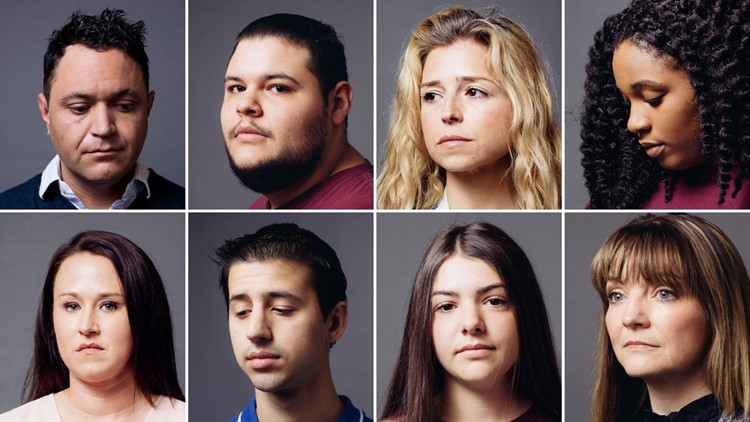(CNN) — Columbine and Parkland.
Two high school massacres, two communities changed forever.
Two fateful days, two decades apart. Tragic bookends in American history.

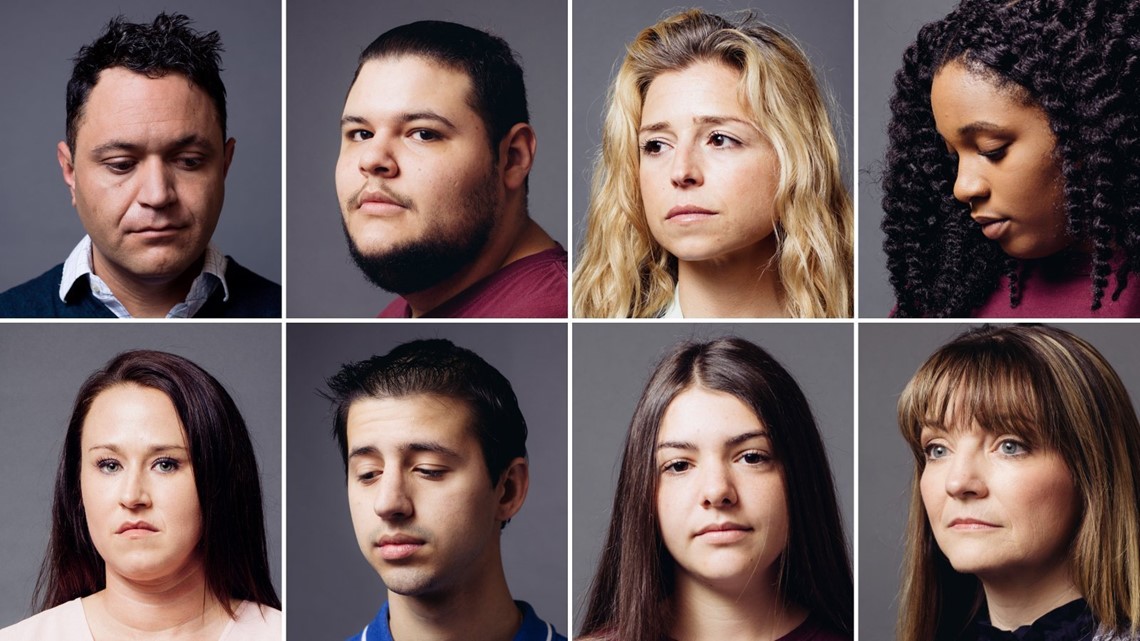
In all, 30 lives lost: 13 in Colorado in 1999, 17 in Florida in 2018.
Hundreds more survived the gunfire. Most escaped the bullets. Still, they carry invisible scars.
Any loud sound can shatter their day: Sirens sounding, fire alarms ringing, a car backfiring. Time has done little to heal the triggers.
Three recent suicides — two Parkland survivors and the father of a 6-year-old girl killed in a mass school shooting at Sandy Hook, in Connecticut — only heighten the struggle.
Saturday marks 20 years since the massacre at Columbine High School, near Denver. The shooting at Marjory Stoneman Douglas High School, north of Miami, is 14 months fresh. What would survivors of these twin tragedies have to teach each other?
Four from Columbine agreed to travel to Parkland to meet with four of their counterparts and speak with CNN’s Brooke Baldwin at the nearby Coral Springs Museum of Art.

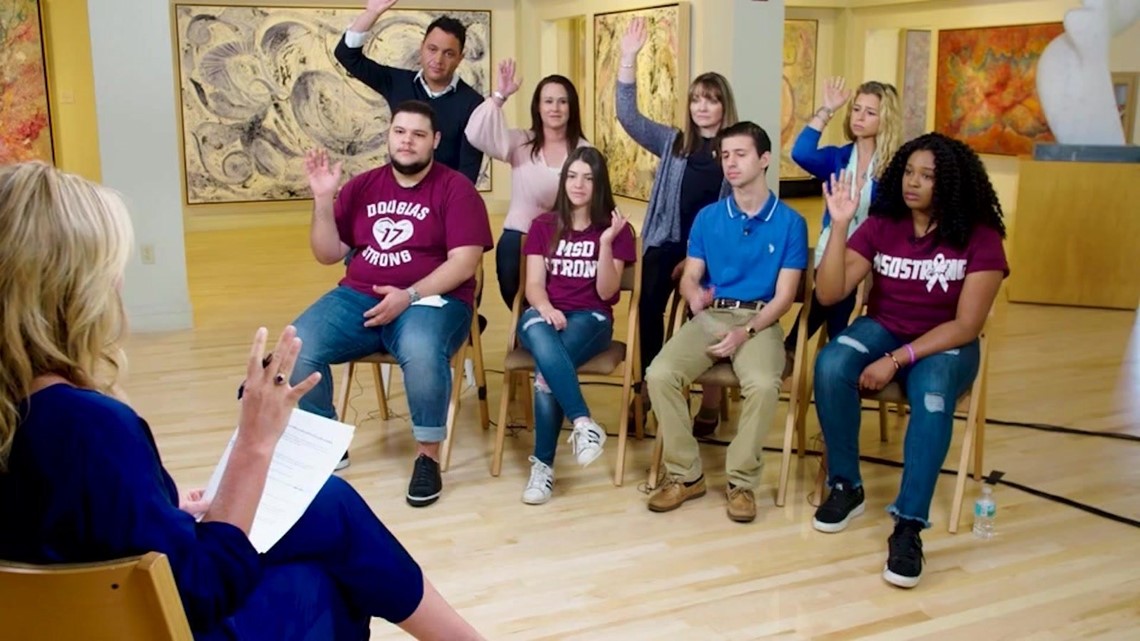
All eight took note of the exits before taking their seats — and saw which one would set off an alarm. Seven of the eight have sought professional mental help.
Together, given their shared dark experiences, they hoped to help and bring light to each other.
‘Trauma doesn’t stop when bullets stop’
Two of the four Columbine survivors said they’ve struggled with suicidal thoughts since 12 students and a teacher were taken from them on April 20, 1999.
Zach Cartaya had a “plan to end it” four years ago, when he was 33. He’d just spent the weekend in jail following a domestic dispute. He planned to drive into the mountains, attach a hose to his car’s exhaust pipe and let the carbon monoxide kill him. There would be no goodbye note. No desperate messages to friends. Nothing.

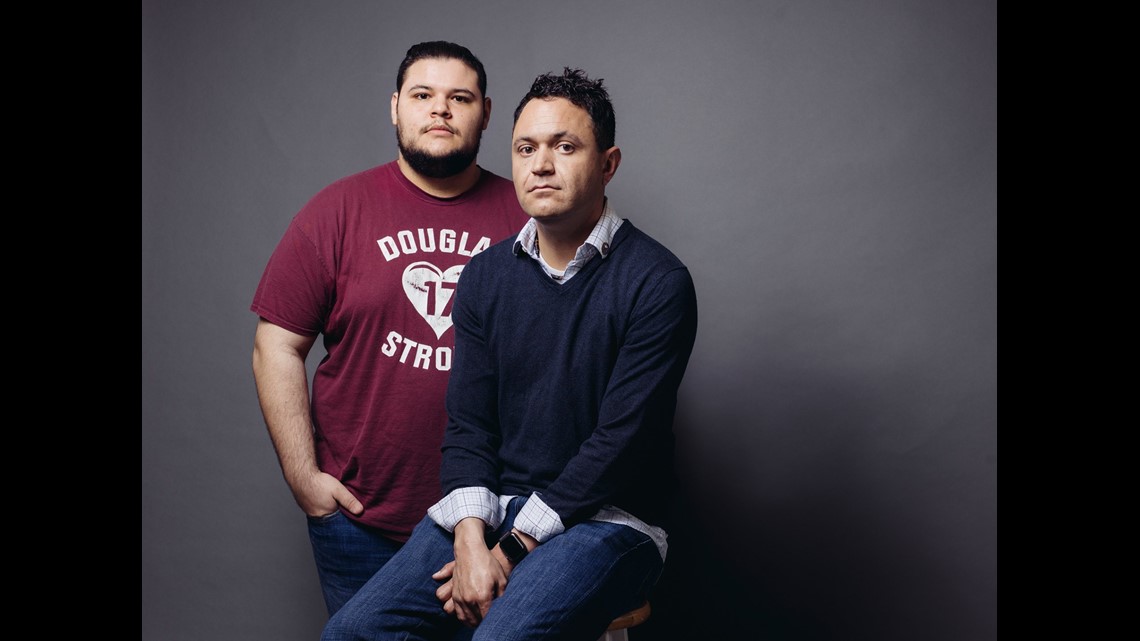
“I wanted to go silently,” he says. “I just wanted to leave the world as quietly as I came into it.”
His mother’s intuition saved his life.
“My mother literally caught me on the way out the door,” he says. “Something in her knew that something wasn’t right.”
He checked into an intensive outpatient program for three months, meeting day and night with psychiatrists and counselors and talking with others in group therapy. He continued with various therapies in the months afterward and immersed himself in The Rebels Project, a support group formed by Columbine survivors.
Today, he shares his experience with Parkland’s Demitri Hoth: “You have to go out in the world and make your own way. And it’s really difficult, and it’s really isolating, and it’s really lonely.”
“If we’re freaking out or if we’re having a panic attack or if we’re just in a low mood, we’re really good at hiding it, because we want to be normal.”

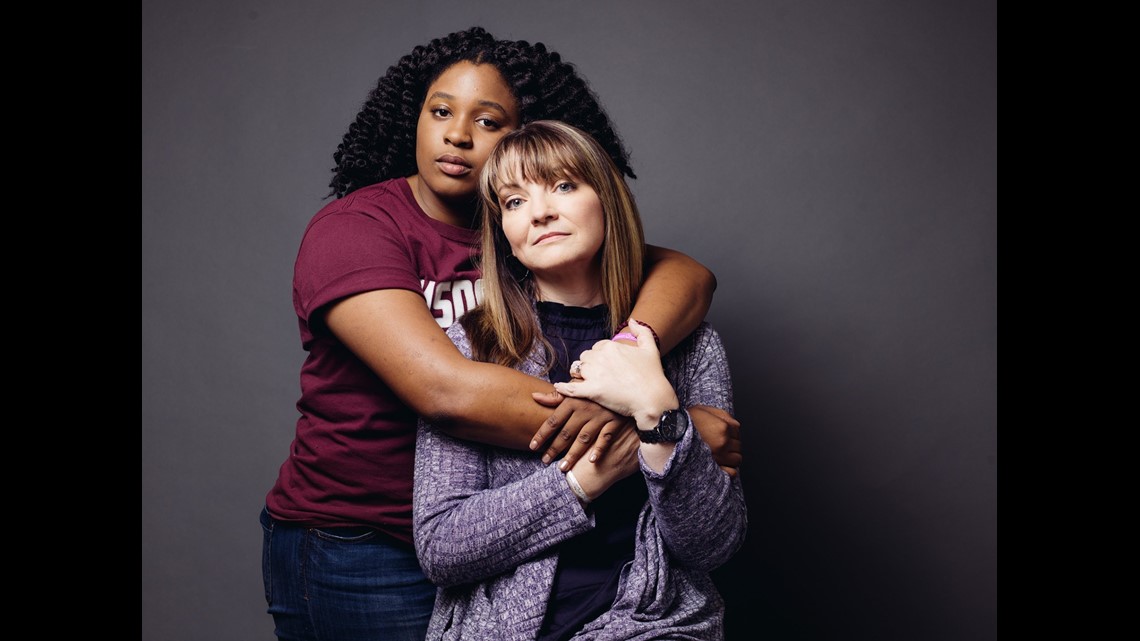
Coni Sanders wasn’t a student at the high school, but she was no less haunted by what happened. Her father, Dave Sanders, was a teacher and coach killed at Columbine.
Her father had dedicated his life to coaching track, girls’ basketball and softball for 24 years. He had three daughters, and his final words were “tell my girls I loved them.” His family chooses to believe that he was speaking not just about his daughters but about all the girls he’d ever coached, too.
After the massacre, Coni says, she wouldn’t have said she was suicidal if anybody had asked. But one night, she says, she took too many sleeping pills and thought, “it would feel good if it could just all be over and I could be with him.”
It’s important, she says, for the Parkland students to know that “it’s OK to not be OK.”
“This trauma,” she says, “doesn’t stop when the bullets stop.”
For the Parkland survivors, the honesty here is jarring. A realization that the issues they face will linger.
“It terrifies me to know that this is going to be throughout my life, forever,” says Sari Kaufman, who was a sophomore on February 14, 2018, when 14 students and three staff members were killed at Marjory Stoneman Douglas.
Mei-Ling Ho-Shing, now a senior, adds, “the fact that it’s been 19 years going on 20, and you’re still going through that. Wow!”
Demitri wants to know, simply, “does it get better?”
‘It’s inescapable’

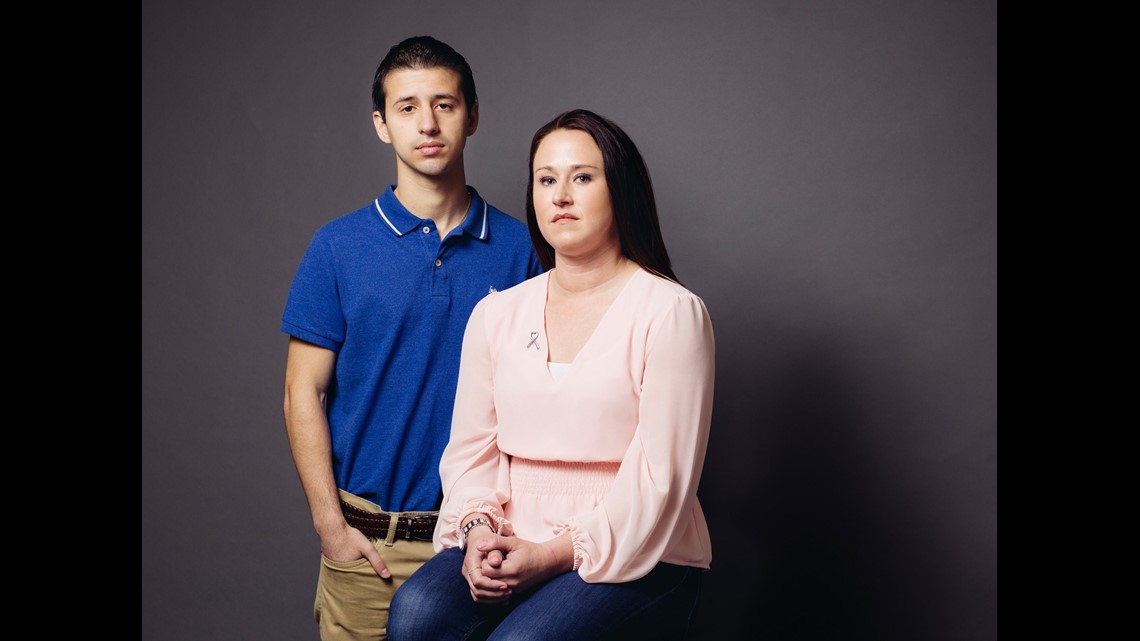
It does, but it’s a marathon. That’s what the Columbine principal told survivors the day after the shooting, and it’s a mantra they carry with them to this day.
Amy Over was a senior in 1999. She tells the Parkland students that there will be “really dark days” in the years ahead, but you’ll learn coping skills to help manage the pain. Be true to yourself.
The Florida survivors, she and the others from Columbine say, have already inspired millions around the globe with their activism — unafraid to confront lawmakers on the need to change gun laws.
“You’re going to find what works for you and what doesn’t work for you,” she says.
Brandon Abzug was friends with Sydney Aiello, whose suicide last month shook Parkland again. They met each other serving in student government. In their senior year, the two shared AP environmental science. The teacher seated students alphabetically. “Her last name was Aiello, and mine is Abzug, so we were always next to each other,” he says.
It’s more vital than ever, he says, to seek help and stay in touch with every survivor: “Surviving a mass shooting stays with you. It’s inescapable.”
Mei-Ling knew Calvin Desir, a 16-year-old Parkland student who took his life in late March. They weren’t close friends, but he once presented her with an award for her activism.
“It’s painful,” she says. “I know friends who graduated who called me crying” after his suicide.
“They just wanted to come home because they feel so far away.”
Mei-Ling was on the second floor of the building where the shooting unfolded at Marjory Stoneman Douglas. She could smell the gunsmoke and hear the screams of classmates. When police entered her classroom, they had their guns drawn. As an African American, Mei-Ling says, “it was trauma on top of trauma.”
Friends call it “the Trauma Olympics,” she says: an unofficial pecking order of who is allowed to grieve more, depending on where you were in the school, whether you were shot, whether you knew somebody who died.
Coni, who was 24 when she lost her father, says there was a similar ranking among Columbine survivors.
She says she would hear things like, “well, you didn’t lose a child.”
“But I lost my dad,” she says through tears. “It’s like we spend a lot of time comparing our grief and comparing our trauma, and there’s no comparison.”
The Columbine students tell their younger peers to seek help. Speak out. Don’t ignore your feelings.
“You’re gonna go through really dark times,” Amy tells Brandon as they sit together. “Times where you don’t think you can take another step forward. But you learn coping skills. You figure out, ‘I need to go get help.’ For me, I had to go punch something.”

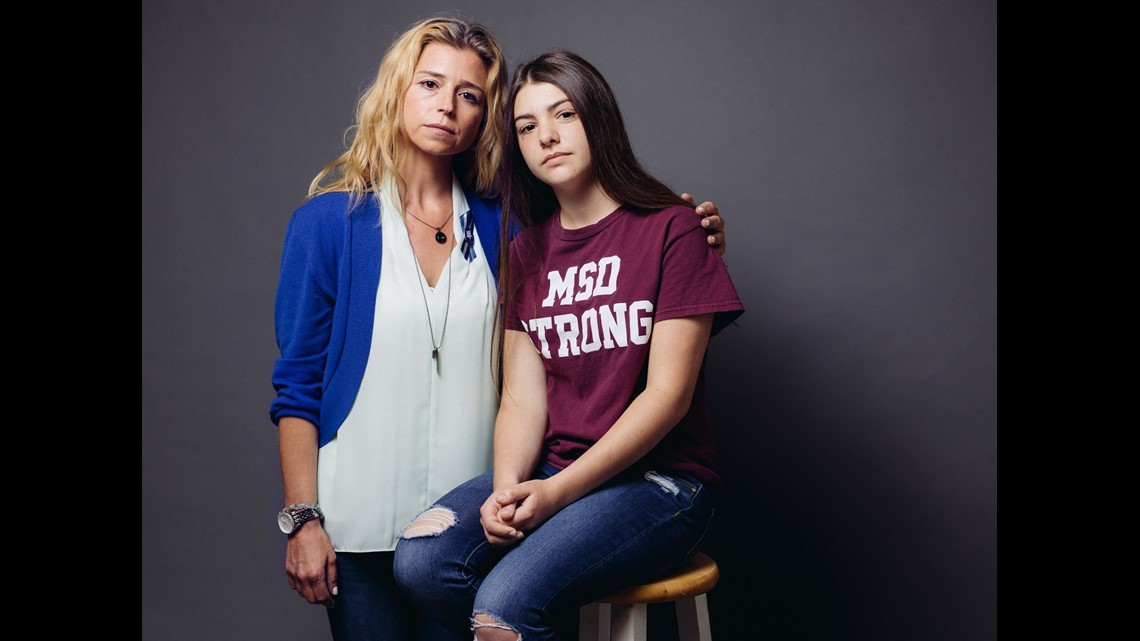
“Be selfish,” says Laura Farber, who directed the documentary “We Are Columbine” for Saturday’s two-decade mark.
“For me, predictability is what I need in my life, because I was expecting to go to lunch on the 20th, and my whole world changed.”
Amy says, “we have this beautiful club that, at first, no one wanted to be a part of. But it’s become part of my identity. I’m proud of who I am. I’m proud of where I’m going.
“We’re no longer a club,” she says. “This is a movement.”
She looks at Demitri, Mei-Ling, Sari and Brandon and tells them, “you guys are my people.”
‘Dad would be so proud’
If there’s a phrase they all hate, it is “the new normal.”
There’s nothing normal about schools getting shot up. Of losing classmates, teachers, coaches, parents.
America, they say, should never be complacent to such carnage.
“This will never be normal,” Coni tells Mei-Ling.
Mei-Ling confides about the triggers — how they can come at any moment. Mei-Ling has always been an activist, speaking out against racism for Black Lives Matter. She’s become even more active over the past year, protesting gun violence, pushing for legislative action and sharing her story of survival with anyone who will listen.
She jokes that she sometimes feels like the “angry black girl.”
“But I’m excited for finding this voice,” Mei-Ling says. “I realize I don’t have to be anybody besides me.”
Coni responds by telling her the world needs her. “You don’t have to apologize for being the angry black lady,” she says. “My dad would be so proud.”
Coni continues, “I almost feel like this 20th anniversary is like handing over the baton like in this really tired way, saying, ‘we’re sorry that we couldn’t stop it. We’re sorry that we couldn’t do more and yet so grateful for you all.’ ”
The two hug, holding each other tight. As they pull away, Coni fans herself and says, “I’m not done. I’m not done.”
They embrace a bit longer.
It changes you
Amy Over had a scholarship to play basketball in college, but the day Coni lost her father, Amy lost her coach. Her mentor who’d instilled in her a love for the game.
Coach Sanders was more heroic that day than when he’d stalk the sidelines and lead the Rebels to victory: He was credited with saving the lives of 100 Columbine students, including Zach and Amy. He was a lunch monitor that day and helped usher students out the doors. He then ran upstairs, telling students to hide, before being shot in the back.
Amy gave up her dream of college ball. The pain was too much. Years later, at 26, she was still struggling. Her mom asked her, “why aren’t you over this yet?”
She took up kickboxing to channel her rage: “I had to get rid of my anger, so I started fighting in a ring.”
Brandon Abzug actively sought the advice of Columbine students after surviving Parkland. He formed a pen pal program to link up survivors of both tragedies so Parkland students could have guidance on how to cope.
He created a list of about 130 Columbine survivors willing to participate and circulated their names among classmates in need of help. Brandon stays in touch with them weekly through Facebook Messenger. Today is the first time he’s met anyone from Columbine.
“They’re there for me,” he says, “and it really helps.”
The recent suicides have made his mission more urgent. “I want more people to know that there are survivors that are willing and able to help,” Brandon says.
Now a student at the University of Florida, he leaves this gathering with a renewed sense of purpose. To turn the worst day of his life into a rallying cry to change the world for better.
Parenting in post-Columbine America
Columbine survivors are now parents. Their children, like millions of others now, go through active-shooter drills.
“The fact that the Columbine generation has to live through that,” Zach says, “is sickening to me.”
Coni didn’t want her children to take part in the drills at first. They knew how her father died, and she was afraid it would traumatize them further. But another parent told her it might endanger the lives of classmates if a shooter entered the school and her kids didn’t know what to do.
In their first drill, her daughters panicked: “It was really sad to see them experience vicarious trauma because of who their grandpa was,” she said. During one lockdown, she says, a student told classmates, “Wouldn’t it be cool if a Columbine happened here so we could be on TV?”
“That just dropped my heart,” Coni says.
The four Parkland students were born after Columbine but knew of the shooting even before death visited their school. Unlike the Columbine students, who ended the year at a different school in a neighboring town, Parkland survivors had to return to the scene of the crime weeks later.
They sat in desks. They roamed the halls. The building where students were killed was cordoned off.
It seemed to them like they had to continue as if everything was normal.
Brandon and Demitri were seniors. The move to college in the months that followed was lonely. When they told new classmates where they went to high school, they were met with looks of shock, followed by awkward silence.
Sari and Mei-Ling remain at Parkland. They’re proud of their community. Both sport “MSD Strong” T-shirts.
Parkland students have become synonymous with activism, having marched on the state Capitol in Tallahassee and the steps of the US Capitol in Washington.
But beneath the activism remain layers of anguish.
“We have to recognize that whoever was on campus that day, no matter where you were, it might not have been as bad as other people, but you still went through a really hard occurrence,” Sari says.
The school has a wellness center that offers counseling, but Mei-Ling says most students avoid it for fear of being seen as weak.
“If you’re having a breakdown or you feel like you have some anxiety,” she says, “you physically have to raise your hand and say, ‘Can I go to the wellness center?'”
Her worst day since the shooting was her first active-shooter drill. Administrators warned students that it would take place, but that did little to calm nerves.
Here’s how she described the drill:
“You get sweaty. You get tired. Your body feels weak. Your heart is racing. You just want to be not there. Then, your brain goes to exactly that: You start hearing gunshots in your head. You hear the sirens. You hear the ambulance.”
You hear everything you never want to hear again.
Saving lives
The Columbine survivors have lived their lives in a fish bowl. The media glare seems to get brighter with each passing year.
They didn’t have cell phones 20 years ago. Police weren’t adequately trained for an attack on a high school. Survivors had no one to turn to for guidance.
Never did they think the horror inflicted upon them would be multiplied — that over the next two decades, the nation would see one mass shooting after another.
The tentacles of their trauma, and the cascade of other crises that followed, are far-reaching.
Kelly Posner Gerstenhaber, a professor of psychiatry at Columbia University and one of the nation’s top suicide experts, took part in the conversation at the Coral Springs museum.
She says it’s especially important for parents, teachers, coaches and friends to ask survivors direct questions about suicidal thoughts.
“When a kid or a parent or anybody is suffering,” she says, “they actually want help, and they just don’t have the will to come to you. We’ve learned that asking directly will save lives.”
From listening to the discussion, she says, it is clear that all eight participants experienced various levels of survivor’s guilt. Those symptoms may show up within weeks or over years.
“We have to embrace each other and understand that — and understand part of the Trauma Olympics is the stigma and misunderstanding of mental health issues, of depression, of trauma,” she says. “People are suffering in silence.”
It is imperative to understand, she says, “that we have to be here for each other as a community to help heal.”
The Parkland students are resilient and inspiring. They’ve stood up to politicians who’ve told them they’re too young to understand the way the world works.
Demitri says he loves it when he gets trolled, because it motivates him to keep fighting for change.
Sari hopes to become a US senator one day. She says it was important to hear from the Columbine survivors, learn about ways to cope and realize “that it’s not just to going to go away.”
Brandon says it was invaluable to meet his peers from the past. “You could see the passion in their eyes.”
Demitri again wants to know whether it gets better with time.
“It does get better,” Amy tells him. “But it’s such a hard question.”
The pain lessens, she explains, but it never goes away.
Zach says it was important to make the trip from Colorado to “tell you guys face-to-face how proud I am of you.”
“I want you to be more aware of the issues,” he says, “so that you don’t make the same mistakes I did.”
The marathon pounds on.


